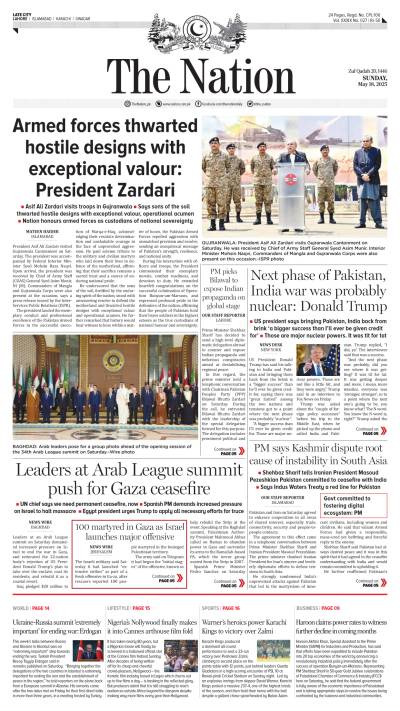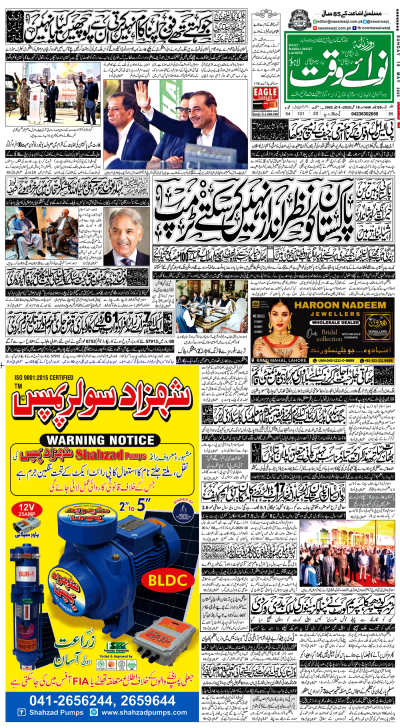Barring a few occasions in the past 64 years, I do not recall Pakistan celebrating one unified Eid-ul-Fitr. Even on those few occasions that we celebrated the Eid officially together, there were isolated pockets and areas where people on call from the local religious leaders celebrated the festival separately. This has become almost a socio-religious dogma. The fervour with which this disparity is being adopted is taking on a serious turn. The manner in which the political leaders backed those who opposed the decisions of the Central Moon-Sighting Committee this religious festival is getting political overtones that reflect regional and provincial sentiments.
Theoretically and even theologically, we claim to profess one faith; Allah, the Prophet, the Quran and the Islam are one. Yet, we Muslims are divided on rigid lines. The disturbing fact is that some of our religious scholars hold rigid and dogmatic views, opinions and decrees that divide Islam in various shades and are not willing to entertain views that they do not like or subscribe to. This divide in the prevailing political and security environment spells doom for Pakistan.
Historically, the Khyber Pakhtunkhwa (KPK) province has always been celebrating Ramazan and Eid separately from the rest of Pakistan. It was said then that the religious scholars in KPK held a tight grip on the masses and their opinion will be followed strictly. This view could be respected in old days when moon sighting was physical. I recall that in the early 1950s, Eids were observed locally depending on the evidence of moon sighting. Despite that fact, the celebration of Eid separately from the rest of Pakistan in the then NWFP had taken on a vivid separate manifestation. I recall that the elders then used to hint at the political overtones of the Red-Shirt movement, while commenting on Eid differences.
Pakistan has unique internal political focus. Our provincial administrative units are demarcated along linguistic boundaries with deep-seated parochial and regional sentiments. This arrangement suited the British colonial masters. Though we inherited the division, we failed to integrate the populace politically, socially and economically. This failure becomes more prominent despite the fact that we claim adherence to one faith. Our regional differences surfaced dangerously during the 1971 internal conflict that broke up Pakistan. Political analyses tried to determine our failure to achieve national integration. Over 40 years down the political road, we - Pakistanis - seem to have learnt nothing!
Our federating units had political aspirations and objectives right from the beginning. The oldest political discord to Muslim League’s political agenda was voiced by the Red-Shirt Leader Khan Abdul Ghaffar Khan, commonly known as Bacha Khan, who had such a political hold in the then NWFP that the region had to hold a referendum to decide its accession to Pakistan. Bachha Khan led a sustained Pakhtunistan movement calling for an independent status for the region. This movement was overtly and covertly supported from across the borders. His antagonism to Pakistan was so strong that he refused burial in Pakistan and opted for Afghanistan as his final resting place.
The present Awami National Party (ANP) is the political successor of Red-Shirt Movement and its central and dominant leadership is held by the dynasty of Bacha Khan. The ANP has always held regional and Pakhtun political ambitions central to its agenda. It renamed the province, giving it strong ethnic and regional identity. There is a lingering suspicion that the ANP still carries the Red Shirt ambitions.
This suspicion is supported by the fact that the ANP always opposes the central government’s plans and projects, and voices regional concerns. The construction of the Kalabagh Dam - so vital for Pakistan’s energy and water conservation - is vehemently opposed by the ANP leadership. Opposition on the issue of moon sighting may appear a trivial matter. Previously, local religious leaders used to defy the Central Moon-sighting Committee. Even those doing so, especially Mufti Popalzai, had political backing. This time around the Regional Moon-sighting Committee has defied the central authority, despite the fact that it falls under it. A sitting minister of the ANP provincial government has supported the regional committee’s decision that gave it the political and moral backing against the central authority.
The establishment of a Central Moon-Sighting Body is an administrative arrangement, which demonstrates the will of the government. Our lunar calendar does have some peculiarities; the countries that have adopted it - Saudi Arabia being one - have a strong central authority that does not permit any dissension. Allama Javed Ghamdi in a TV talk show on the subject of moon sighting said that in an established political setup moon sighting may generate difference of opinion (ikhtelaf), but once a decision is made, defiance (inheraf) should not be allowed. It erodes the writ of the central authority and sustained erosion weakens the state.
In Pakistan, regional and ethnic political fissures abound. We are divided along regional lines; apart from Pakhtunistan sentiments, we are living with nationalist problems in Balochistan (BNA), in Sindh (JSQM), Hazara and Seraiki provincial demands. All these hit at the efficacy of a central authority and writ. Political equality and equal opportunity is a good thing, but if that is achieved at the cost national unity, then the government has to adopt a definite position. It will be prudent and imperative at the central government level to ask the Regional Moon-Sighting Committee to explain its position.
The federal government must stand behind the Central Ruet-e-Hilal Committee and provide it full moral, legal and political backing for handling the regional committee. It should also ask the ANP leadership the reason they went against the central decision, despite being its allies in the centre and province. If the central government finds it difficult to confront an ally, then it should abolish the Central Moon-Sighting Committee and let the regions revert to old practice of physical moon sightings. We will have the festival spread over many days to enjoy the feasts. At least, the impression that centre’s will is being defied will vanish. Despite scientific progress, we remain conservatives at heart.
The writer is a retired brigadier.
Email: arjerral639@hotmail.com
Sunday, May 18, 2025
Our Eid dilemma
DPM Ishaq to embark on three-day China visit tomorrow
6:45 PM | May 18, 2025
Pakistan's armed forces thwarted enemy threats with bravery: Attaullah Tarar
6:43 PM | May 18, 2025
Road mishap in Dir Upper claims one life
May 18, 2025
-
Lahore emerges among safest global cities in Numbeo 2025 index
-
Lahore emerges among safest global cities in Numbeo 2025 index
-
India’s suspension of Indus Water Treaty legally baseless
-
Seventh polio case reported in Pakistan amid nationwide vaccination drive
-
Pakistan reports sixth polio case of 2025
-
PTA begins issuing VPN licences to regulate usage
Culture Shift
May 18, 2025
Tactical Shift
May 18, 2025
Unmasked Cruelty
May 18, 2025
India Isolated
May 17, 2025
Descent into Hell
May 17, 2025
Fostering Entrepreneurship
May 18, 2025
Behind a Promising Job Offer
May 18, 2025
Indo-Pak Wisdom
May 18, 2025
Traffic Signal at Shahzad Town
May 18, 2025
English a Measure of Intelligence?
May 17, 2025
ePaper - Nawaiwaqt
Nawaiwaqt Group | Copyright © 2025





